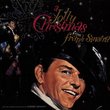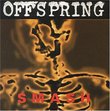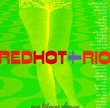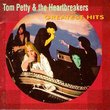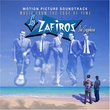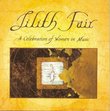| All Artists: Various Artists Title: Classic Folk From Smithsonian Folkways Members Wishing: 7 Total Copies: 0 Label: Smithsonian Folkways Release Date: 7/27/2004 Genres: Folk, Pop Style: Traditional Folk Number of Discs: 1 SwapaCD Credits: 1 UPC: 093074011027 |
Search - Various Artists :: Classic Folk From Smithsonian Folkways
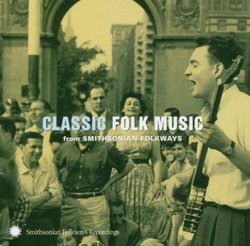 | Various Artists Classic Folk From Smithsonian Folkways Genres: Folk, Pop
We often take for granted the supremacy of artists such as Doc Watson, Woody Guthrie, Pete Seeger, Lead Belly, Big Bill Broonzy, Brownie McGhee, and other folk music legends. Classic Folk sheds new light on the success of ... more » |
Larger Image |
CD DetailsSynopsis
Album Description We often take for granted the supremacy of artists such as Doc Watson, Woody Guthrie, Pete Seeger, Lead Belly, Big Bill Broonzy, Brownie McGhee, and other folk music legends. Classic Folk sheds new light on the success of the urban intellectual-driven movement that made rural white and African-American artists and their music favorites of audiences everywhere. This recording features classic performances by classic artists doing some of their classic songs during the great folksong revival of the 1940s through 1960s. It is some of the great performances from the vaults of Folkways Records. Compiled and annotated by Jeff Place. Similarly Requested CDs
|
CD ReviewsBranches of the roots Jerome Clark | Canby, Minnesota | 01/20/2005 (4 out of 5 stars) "It wasn't all that long ago that many rock critics were trying to bury the folk (excuse me, "folkie") revival of the 1950s and '60s as some kind of embarrassing temporary diversion from the only valid genres: pop and rock. Such numbskullery has largely (though not quite entirely) passed. Besides the flood of recordings by authentic roots artists, past and present, in recent years, we have been treated to retrospectives from such influential revival labels as Vanguard, Elektra, and Prestige Folklore. But the label that started the revival, Folkways (Smithsonian Folkways these days), is only now documenting its role in that influential cultural movement and moment. Put together by Smithsonian Folkways' Jeff Place, a front-rank authority on recorded American roots sounds, Classic Folk Music features the inevitable Woody Guthrie, Pete Seeger, and Lead Belly -- who, of course, should be here -- as well as others who may not be familiar to the more casual listener. But the quality of song and performance is mostly high. Though they went on to become revival stars, some artists had authentic traditional roots (among them Doc Watson, Hobart Smith, Elizabeth Cotten, and Brownie McGhee; McGhee's version of the 1920s murder ballad "Betty and Dupree" is arguably the most perfectly accomplished cut on the album). Others are unmistakably smoother and city-bred, perhaps none more so than Paul Clayton, in his lifetime more influential than gifted, now only dimly remembered as the guy from whom Dylan stole the melody to "Don't Think Twice, It's All Right." Another Dylan melody, for "Blowin' in the Wind," was inspired by Paul Robeson's moving rendition of the anti-slavery anthem "No More Auction Block." On the other hand, Barbara Dane's reading of Guthrie's "Deportees" strikes me as a trifle overwrought, and though not bad certainly not her most assured performance. Pete Seeger, featured twice, is, well, Pete Seeger, but half-brother Mike Seeger's "John Hardy" is at that very high standard one associates with any performance he sets his mind to. I've heard Dave Van Ronk's "Duncan and Brady" many times over the four decades that have passed since my first listening, and it still sounds fresh, among the most spectacularly convincing -- and darkly funny -- performances to come out of the revival. Jean Ritchie weighs in with the undeservedly obscure, beautiful, and deeply sad "Most Fair Beauty Bright." Phil Ochs wrote some memorable songs, but none in my opinion equals the uncharacteristically apolitical, melancholy reflection "Changes." This disc shows how good the revival's major talents were, and how little the sometimes profound music they produced has aged. This recording comes out of the world that Dylan affectingly recalls in the memoir he published last year. If you don't know already and want to learn, here's the place to start finding out for yourself what he meant. And let's hope that Smithsonian Folkways is laying plans for more of the same." Folk Music-The Graduate Course Alfred Johnson | boston, ma | 12/18/2008 (5 out of 5 stars) "Recently, in a review of a three volume set of CDs entitled "Troubadours of The Folk Era" containing songs done by many of the folk singers then coming in prominent in the 1960's, I headlined the entry "Folk Music 101-There Are Many Rooms In That Mansion" . That entry however, in a way, begged the question of how those singers (or listeners like me) traced their ways back to the roots of folk. Well, my friends, I have the answer, or at least part of it, here in this little gem of a CD. Sure we all, later when we understood things better, appreciated that John and Allan Lomax did yeomen's service to roots music by their travels into the hinterlands in the 1930's and 1940's (and had Pete Seeger tag along for a year and thus serve as a little transmission belt to the latter generation) to find blues, mountain and other types of American traditional music. However, most of us got our folk infusion second-hand through our addiction to local coffeehouses and the fledgling performers who provided us entertainment there. They, in turn, learned their material from the masters who populate this CD. You doubt the truth of that statement? Well, let's go through the litany. On one CD we have Woody Guthrie doing "Pastures of Plenty"; Pete leading "We Shall Overcome; Lead Belly on "Rock Island Line"; Doc Watson on "John Henry"; Elizabeth Cotton on the super-classic "Freight Train (a right of passage for virtually every 1960's performer); Paul Robeson on "No More Auction Block" (it will give you goose bumps to hear that voice); Big Bill Broonzy on "This Train" and on and on. This is the core of folk, take my word for it. No don't. Get this CD and get `religion' on your own. A word is also in order about the role of Moses Asch, his Asch recording studio in New York City and his role as the producer of many of the classic folk songs in the 1940's and 1950's that I have gleaned from the always excellent liner notes provided by Smithsonian Folkway. As I have noted previously in this space the folk revival of the 1960's did not form tabula rasa. Asch's commitment is a testament to that proposition. It therefore is no accident that the early flowering of the folk revival was in New York City as that is where one could find the `refugees' from elsewhere from the `red scare', during the hard political winter of the 1950's. Nor is it accidental that left-wingers blacklisted, like Pete Seeger, Woody and Paul Robeson, by the government are liberally represented in this collection. When one is searching for some kind of critique of society there is bound to be a folk song by some damn radical that reflects that outrage. Or gets prominence due to that struggle. Witness in that regard the history of the song "We Shall Overcome" and its relationship to the black civil rights movement. I should also point out that the liner notes provide an interesting fact about the older generation of folk performers like Woody Guthrie and the young revivalist of the 1960's. The notes point out that a fair proportion of the folk revivalists came to love the music from songs they learned as children at summer camp. Woody and Pete Seeger are well-known for their children's songs. So, maybe the government was right to see "reds" under every bunk bed corrupting the morals of the youth. Oh, well. As a general observation the producers of this CD, Smithsonian Folkway (the name itself should be a give away about the quality of this production) went out of their way, way out of their way to get the best renditions available of the songs by the individual artists represented and to provide the best range of what folk meant to those who wrote the songs, sang them and listened in. As I mentioned above in that earlier review of the 1960's folk scene for those too young to have heard the music then you have been given a reprieve- take advantage of it. " If you value great early American recordings... Lee Justice | Stokesdale, NC USA | 12/14/2008 (5 out of 5 stars) "then this CD is for you. The emotion and expressions by the artists are some of the finest field and live recordings captured on one CD. A truly historical collection."
|

 Track Listings (25) - Disc #1
Track Listings (25) - Disc #1